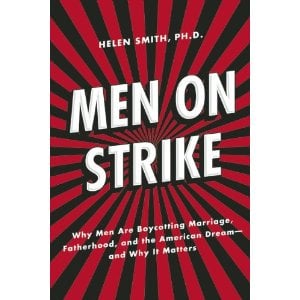Two weeks ago at First Things, I wondered what it would be like if Rep Jan Schakowsky (D-IL) had her way and women ruled the world.
This week I’m continuing on the theme of men and women and families and faith:
Family illiteracy, [author Mary Eberstadt] says, “breeds religious illiteracy.”
In turn, increasing our scriptural literacy is one way for Christian communities to help their members understand and form families. Eberstadt’s book…has, in tandem with Helen Smith’s Men on Strike, reignited my admiration for the under-appreciated, underutilized Book of Tobit, which we are currently reading at daily Mass, and which is all about family, and the hope and healing that is drawn from the God-driven life force of familial love.
The book opens with the narrator, Tobit, describing his brief exile from Nineveh and then his blindness, which makes him feel so unmanned that he hectors his wife until a strain on his marriage leaves him woe-begotten enough to wish for death.
I hope you’ll go over to First Things, as much to read the whole thing as to read the first comment which is an eye-opener, but I also hope you’ll check out these two books by Eberstadt and Smith — two writers coming from very different places — and read them together, because experienced in that way they’re like a sacred-and-secular-one-two-punch to the social solar plexus.
 As important as both books are (and you really must read Kathryn Jean Lopez’ interview with Eberstadt), I want to especially focus on Men on Strike:Why Men Are Boycotting Marriage, Fatherhood, and the American Dream – and Why It Matters because if the deconstruction and devaluation of the family is to be resisted, then that resistance must include — perhaps must begin with — a renewed understanding and appreciation for men, masculinity (and even manliness) as elements and beings crucial to the continuance of a working, balanced, sane and humane society.
As important as both books are (and you really must read Kathryn Jean Lopez’ interview with Eberstadt), I want to especially focus on Men on Strike:Why Men Are Boycotting Marriage, Fatherhood, and the American Dream – and Why It Matters because if the deconstruction and devaluation of the family is to be resisted, then that resistance must include — perhaps must begin with — a renewed understanding and appreciation for men, masculinity (and even manliness) as elements and beings crucial to the continuance of a working, balanced, sane and humane society.
We have reached a point where not only Maureen Dowd but a few men, themselves, are beginning to argue that they’re unnecessary, but entertaining little things. Women are taking the lead in academia; they are the majority of grad students and med students, and approaching parity in law school. Increasingly, they are the household breadwinners, too — they’re even the distractors of terrorists, in certain situations — while the men…well…where are the men?
As the mother of two sons grown into good men (and the grateful wife of an exceptionally kind, smart and able fellow) I have long-admired Dr. Helen Smith and her determination to defend men in the midst of “useless men stupid dads” narratives that have become so commonplace throughout media that it’s hard to believe it’s not intentional.
The casual bashing of men has become so kneejerk that even as she sympathetically notes the trouble they’re in Kathleen Parker can’t resist going for the cheap condescension that tries to be cute but ultimately makes the point for her and undermines her defense:
My argument that men should be saved is that, despite certain imperfections, men are fundamentally good and are sort of pleasant to have around. Most women still like to fall in love with them; all children want a father no matter how often we try to persuade ourselves otherwise. If we continue to impose low expectations and negative messaging on men and boys, future women won’t have much to choose from.
We are nearly there.
Beyond citing empirical studies, research and news studies, in Men on Strike, Smith, a forensic psychologist, argues that “men are not defective girls” and she does what none of the pundits or number-crunching social researchers are bothering to do: she is talking to men and offering them a platform to both express frustration and provide an answer as to where all the men have gone, and why they seem to be…
On Strike from College:
It comes down to one observation. Men must live a double life on campus. To succeed, men must believe on thing, but act like they believe another. Manliness wants to compete, to win, to boast, to glory, even to fail honorably against the best. This is disallowed to men on campus. Winners are picked, not discovered. It was clear to me, the winners would almost always be females and occasionally males who lived the double life. I left.
— “Jeff”
On Strike from Marriage:
It is said that men can’t handle intimacy. That’s not it at all. It is sadness that men can’t handle and they fear that intimacy will take them there.
— “Jack”
Problem is [most of the guys I talk to] tell me that [marriage] is one of the worst mistakes that they ever made. Some tell me not to marry American women, that they are all feminist at heart. One married guy told me that I could get the same effect by selling my house, giving all my money away and having someone castrate me. This is really starting to unnerve me, and the more I learn about the legal bias against men, I’m beginning to back off marriage.”
— “Anonymous”
On Strike from Society:
I used to coach girls’ soccer with my fiancee (now wife). I stopped because one of the girls (all of 8 years old) said: “I don’t have to listen to you. I can get you in trouble just by telling people you touched me.”
Now that I have a child of my own, I have no idea how I’m going to be involved when he wants to do sports or other activities. I already got looks on the playground the year I was a stay-at-home dad and carting him around with me, all the time.
— “NV”
There was no sadder scene to a movie than in Juno, when married guy Jason Bateman realized that in his entire huge house, he had only a large closet to keep all the stuff he loved. That bit me like a punch in the face.
— “Playstead”
It must be acknowledged that in Juno, Bateman’s character was a bit of a man-child who ultimately chose to remain one rather than become a parent, and that both Juno’s father and the father of her baby were well-developed, responsible and (for their respective ages) mature men who were valued, but I take this fellow’s point. In many homes we see an over-represent the women living in them, in terms of decorating and the “stuff” that is around, while the men’s interests are relegated to a room or a “man-cave” basement, out-of-sight and inoffensive to more “elegant” sensibilities.
Men on Strike is something for which the mothers of sons, and the socially-interested, should be grateful because it is an argument for men, made by a woman and offering men a chance to speak out without risk of ridicule or retribution. We need to hear what our men are saying — and we need to address the fact that in our determination to remedy the social disparity of the past, we have overcorrected to the point where one female lawyer tells Smith, “I am a masculine woman but I still need someone who is more masculine than me.”
Smith responds, “Our society tells men they are worthless perverts who reek of male priliege while simultaneously castrating them should they act in a manly manner, and now women are upset because men are becoming feminized? You reap what you sow.”
Almost all social or self-remedies can extend into over-correction. In my own book, Strange Gods, I write of a childhood focus on the pendulum of a grandfather clock as it swung back and forth:
I was fascinated by that hovering nanosecond of suspension at either end, that moment when the brass circle had swung as far left as it could go and had no option but to swing back to the right. There it would reach its culmination and throw left again. This constant state of flux was necessary in order to get an accurate reading of the time. . . . Eternal suspension at the extremes or dead center — all either can promise is distortions of reality. True balance, then, requires some regulated give-and-take if it is to be productive, and if its productivity is meant to be authentic.”
If the social movements and policies that have brought us to this point were ever authentic in their stated intentions to raise and honor the dignity of all, it may be time for the pendulum to swing back from over-correction. We need our men.
Related:
An Interview with Helen Smith
It’s time to stop treating dads like idiots
What My Father Taught Me
The War on Boys and Anti-Gun Hysteria
Fathers are not Fungible
A father’s pain on losing a child
A Manly Apology
Where Your Mind Goes, So Will Your Life
Fanatics are usually oblivious
Deliberately disenfranchising fathers
Passivity to the Slaughter
Father/Son Image courtesy of shutterstock.com












